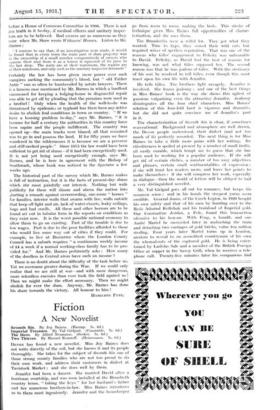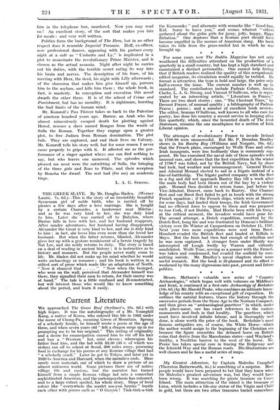Fiction
A New Novelist
Seventh Sin. By Joy Baines. (Harrap. 7s. 6d.)
Two Thieves. By Manuel Komroff. (Heinemann. 7s. 6d.) DEVON has found a new novelist. Miss Joy Baines does
not write directly of the soil, but she knows it and its people thoroughly. She takes for the subject of Seventh Sin one of
those strong county families who are not too proud to do their own work, and address their customers in dialect at Tavistock Market : and she does well by them.
Jennifer had been a dancer. She married David after a hurricane courtship, and was soon installed at the Brandreth country home, "taking the keys" for her husband's father
and her numerous brothers-in-law. Miss Baines introduces US to them most ingeniously. Jennifer and the housekeeper
go from room to room, making the beds. This stroke of technique gives Miss Baines full opportunities of charac- terization, and she uses them.
The Brandreths were a wilful lot. They got what they wanted. True to type, they sowed their wild oats but required wives of spotless reputation. That was one of the reasons why Giles' engagement to Felicity was unbearable to David. Felicity, as David had the best of reasons for knowing, was not what Giles supposed her. The second reason was that he was jealous of Giles. With the obst limey of his sort he resolved to tell Giles, even though this must react upon his own life with Jennifer.
He tells Giles. The brothers fight savagely. Jennifer is involved. She learns jealousy ; and one of the best things in Miss Baines' book is the way she shows this ugliest of passions vulgarizing even the attractive Jennifer. Jealousy disintegrates all the four chief characters. Miss Barnes' solution of this four-fold knot is vigorous and dramatic, but she did not quite convince me of Jennifer's part in it.
The characterization of Seventh Sin is clear, if sometimes conventional. Background and atmosphere are well drawn, the Devon people understood, their dialect (and not too much of it) perfectly recorded. The next thing is for Miss Baines to take a little MOM pains with her writing. Its effectiveness is spoiled at present by a number of small limits, all easily curable, which tempt me to guess that she has been used to working for a popular audience. If she will get rid of certain cliches, a number of too easy adjectives and phrases, certain small sentimentalities of expression : if she will trust her readers more, and leave her points to make themselves : if she will compress her work, especially in dialogue—then the world of letters will be obliged to hail a very distinguished novelist.
Mr. Val Gielgud goes all out for romance, but keeps his common sense : and in his hands the steepest yarns seem credible. General Janin, of the Czech Legion, in 1920 bought his own safety and that of his men by handing over to the Reds Admiral Koltchak and his trainload of Imperial gold. One Constantine Jordan, a Pole, found this transaction offensive to his honour. With Feng, a bandit, and one Andre Martel he succeeded later in ambushing the train and detaching two carriages of gold bricks, value ten million sterling. Four years later Martel turns up in London, anxious to reveal to an accredited countryman of his own the whereabouts of the captured gold. Ile is being enter- tained by Ladislas Sale and a member of the British Foreign Office at supper in the Savoy Grill, when he receives a tele- phone call. Twenty-five minutes later his companions find him in the telephone box, murdered. Now you may read on ! An excellent story, of the sort that makes you late for meals : and very well written.
Politics form the background of The Hero, but in no other respect does it resemble Imperial Treasure. Hoff, ex-officer, now professional dancer, appearing with his partner every night at a café as "Umberto and Ly," is implicated in a plot to assassinate the revolutionary Prime Minister, and is chosen as the actual assassin. Night after night he carries out his duties, with the terrible secret eating its way into his brain and nerves. The description of his fears, of his meeting with Herz, the deed, his night with Lilly afterwards ; of the obsession that makes him give himself up, pursues him to the asylum, and kills him there ; the whole book, in fact, is masterly. In conception and execution this novel dwarfs the other three. It is of the school of Crime and Punishment, but has no morality. It is nightmare, bursting the frail limits of the human mind.
Mr. Komroff's Two Thieves takes us back to the Palestine of nineteen hundred years ago. Barzor, an Arab who has almost miraculously escaped death for plotting against Herod, rescues a slave named Rongus from the wrath of Sulla the Roman. Together they engage upon a greater plot, to free Judaea from Roman domination. The plot fails. They are captured, and end their lives on Calvary. Mr. Komroff tells his story well, but for some reason I never came properly to grips with it. It affected me as the per- formance of a singer against whom one can find nothing to say, but who leaves one unmoved. The episodes which pleased me most were the outwitting of Sulla, the bringing of the three girls and Zozo to Pilate, and their reception by Buncha the dwarf. The rest had (for me) an academic tinge.
L. A. G. STRONG.































 Previous page
Previous page